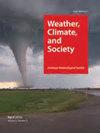Sentiment Analysis of Weather-Related Tweets from Cities within Hot Climates
IF 1.9
4区 地球科学
Q3 ENVIRONMENTAL STUDIES
引用次数: 1
Abstract
Evidence exists that exposure to weather hazards, particularly in cities subject to heat island and climate change impacts, strongly affects individuals’ physical and mental health. Personal exposure to and sentiments about warm conditions can currently be expressed on social media, and recent research noted that the geotagged, time-stamped, and accessible social media databases can potentially be indicative of the public mood and health for a region. This study attempts to understand the relationships between weather and social media sentiments via Twitter and weather data from 2012 to 2019 for two cities in hot climates: Singapore and Phoenix, Arizona. We first detected weather-related tweets, and subsequently extracted keywords describing weather sensations. Furthermore, we analyzed frequencies of most used words describing weather sensations and created graphs of commonly occurring bigrams to understand connections between them. We further explored the annual trends between keywords describing heat and heat-related thermal discomfort and temperature profiles for two cities. Results showed significant relationships between frequency of heat-related tweets and temperature. For Twitter users exposed to no strong temperature seasonality, we noticed an overall negative cluster around hot sensations. Seasonal variability was more apparent in Phoenix, with more positive weather-related sentiments during the cooler months. This demonstrates the viability of Twitter data as a rapid indicator for periods of higher heat experienced by public and greater negative sentiment toward the weather, and its potential for effective tracking of real-time urban heat stress. Social media such as Twitter allow individuals to broadcast their opinions in real time, including perceptions and sensations related to weather events. Evidence from two cities exposed to hot weather—one equatorial and one desert subtropical—indicates that tweets were sensitive to seasonal temperature differences even within a small range. For Twitter users exposed to no strong temperature seasonality, generally negative sentiments to hot weather were seen year-round. In Phoenix with more pronounced seasonality, tweets were more positive in sentiment during the cooler months. This result shows promise for the medium as a rapid real-time indicator—or a snapshot—for societal sentiment to weather events.气候炎热城市天气相关推文的情绪分析
有证据表明,暴露在天气危害中,特别是在受热岛效应和气候变化影响的城市,会严重影响个人的身心健康。目前,个人对温暖环境的接触和感受可以在社交媒体上表达,最近的研究指出,带有地理标记、时间戳和可访问的社交媒体数据库可能预示着一个地区的公众情绪和健康状况。这项研究试图通过推特和2012年至2019年两个气候炎热的城市的天气数据来了解天气和社交媒体情绪之间的关系:新加坡和亚利桑那州凤凰城。我们首先检测到与天气相关的推文,然后提取描述天气感觉的关键词。此外,我们分析了描述天气感觉的最常用单词的频率,并创建了常见的二元图,以了解它们之间的联系。我们进一步探讨了描述高温和高温相关热不适的关键词与两个城市温度分布之间的年度趋势。结果显示,与高温相关的推特频率和温度之间存在显著关系。对于没有强烈温度季节性的推特用户,我们注意到围绕热感觉的总体负面集群。菲尼克斯的季节变化更加明显,在凉爽的月份,与天气有关的情绪更加积极。这证明了推特数据作为公众经历的高温时期和对天气的负面情绪的快速指标的可行性,以及其有效跟踪实时城市热压力的潜力。推特等社交媒体允许个人实时传播他们的意见,包括与天气事件有关的感知和感觉。来自两个暴露在炎热天气中的城市——一个是赤道城市,一个是亚热带沙漠城市——的证据表明,即使在很小的范围内,推特对季节性温差也很敏感。对于没有强烈温度季节性的推特用户来说,全年都会出现对炎热天气的负面情绪。在季节性更为明显的凤凰城,在凉爽的月份,推特的情绪更为积极。这一结果表明,媒体有望成为社会情绪对天气事件的快速实时指标或快照。
本文章由计算机程序翻译,如有差异,请以英文原文为准。
求助全文
约1分钟内获得全文
求助全文
来源期刊

Weather Climate and Society
METEOROLOGY & ATMOSPHERIC SCIENCES-
CiteScore
3.40
自引率
13.60%
发文量
95
审稿时长
>12 weeks
期刊介绍:
Weather, Climate, and Society (WCAS) publishes research that encompasses economics, policy analysis, political science, history, and institutional, social, and behavioral scholarship relating to weather and climate, including climate change. Contributions must include original social science research, evidence-based analysis, and relevance to the interactions of weather and climate with society.
 求助内容:
求助内容: 应助结果提醒方式:
应助结果提醒方式:


